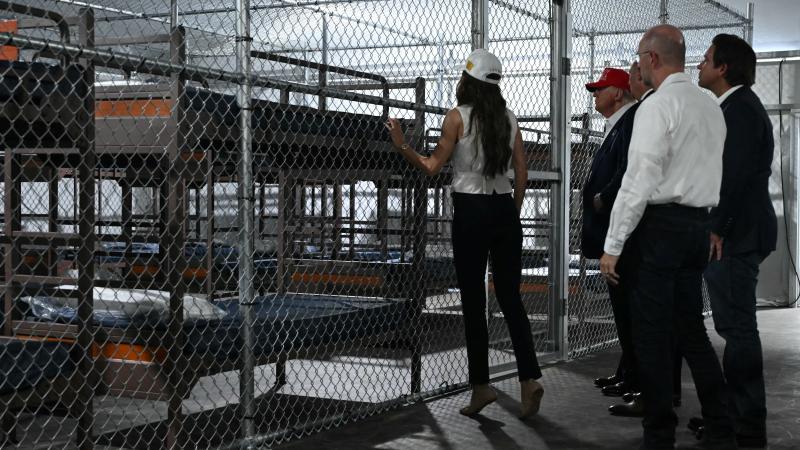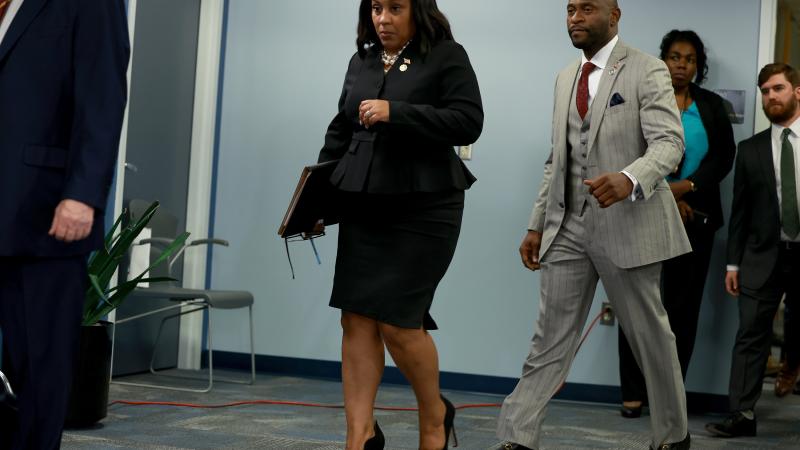Feds creating comic books to push COVID masks, fight disinformation on 5G and elections
Homeland's cybersecurity agency has published two "graphics novels" with ambitions for more, but some see anti-conservative bias.
Colorado voters perusing their Secretary of State Web site ahead of this week's elections are directed in the "What You Can Do" section to a most-unexpected resource: a comic book purporting to educate them on "deep fakes," "troll farms" and "election misinformation."
If the tool isn't surprising enough to voters, its publisher just may be: It's Uncle Sam.
Since October 2020, the Homeland Security Department's Cybersecurity and Infrastructure Security Agency (CISA) has published two "graphic novels" aimed at combatting what it sees as two dangerous myths in America: Elections can be stolen and 5G towers have a connection to the COVID-19 pandemic.
The ranking Republican on the Senate Homeland Security and Governmental Affairs said the comic books are powerful examples of ideology being placed ahead of security.
"When I helped pass the bill to rename CISA, the intent was to help the agency focus on Cyber and Infrastructure security, not establish itself as a comic book publisher or the Ministry of Truth," Sen. Ron Johnson, R-Wis., told Just the News on Sunday "This is just one more sad example of what America gets with Democrat governance: less security, more nanny state.”
CISA declined to say how much taxpayer money was spent on the comic books, but defends the work.
"Disinformation campaigns are a direct threat to our democracy," the agency said. "Ensuring that the American people have the tools to recognize false narratives is crucial to protect our nation. The Resilience Series is an innovative way to reach new audiences and raise awareness of the dangers associated with the spread of false information online."
The comic books feature high-quality artistry and story writing and feature memorable protagonists: international troll farm hunters in the election information narrative "Real Fake" and a young crusading journalist who combats the 5G conspiracy theory in the story "Bug Bytes" after her repairman father is beat up by thuggish Michigan 5G opponents setting fire to a 5G tower.
The publications, one released a year ago and the other in April, even come with promotional YouTube trailers as well as plenty of paternalistic messaging.
"What is it, Dad?! You do realize that I am a woman in her mid-twenties," the fictitious Bug Bytes journalist Ava Williams asks when her father Frank calls her from his cell phone.
"Nothing, other than I noticed you didn't have your mask on," her father responds. "Just reminding you to be safe!"
Just before the exchange, the comic book features an episode on a college campus, where a young female student wearing a COVID-19 protective mask implores one of her fellow male students to do the same.
"Could you please put on your mask! There are hundreds of people here! And I am not ready for you to become a statistic!" the female student declares.
Most of the rest of "Bug Bytes" seeks to dispel stories once spread by QAnon supporters and even some pop culture stars that 5G towers had a connection to the spread of COVID-19. Health officials emphatically deny such a connection.
You can read the full comic book here:
The Resilience Series novels proclaim in their prologues to be completely fictitious, and disclaim they are trying to demean any particular point of view.
"CISA produced this graphic novel to highlight tactics used by foreign government-backed disinformation campaigns that seek to disrupt American life and the infrastructure that underlies it," the disclaimer reads.
"CISA's publication of information materials about this issue are intended for public awareness, and are not intended to restrict, diminish, or demean any person's right to hold and express any opinion or belief, including opinions or beliefs that align with those of a foreign government, are expressed by a foreign government-backed campaign, or dissent from the majority. CISA celebrates the First Amendment rights of all U.S. persons without restriction."
The agency acknowledges the story lines are "are based on actual nation-state adversary activity," but insists "the story and all names, characters, organizations, and incidents portrayed in this production are fictitious."
The election misinformation comic book "Real Fake" features crusading troll farm hunters Rachel and Andre and purports to combat a misinformation operation clearly derived from the findings of the Mueller Report narrative on Russian intervention in the 2016 election.
It draws from some of the report's findings championed by liberals — troll farms, deep fakes and social media misinformation campaigns — and even suggests that one of conservatives' favorite terms for the federal bureaucracy — the "deep state" — is Russian disinformation.
"Take this garbage off the web and stop trying to pass off this stuff as real" Andre chides one of the suspected trolls with a code name Single0. "The American people are smart enough to spot a fake!"
"The truth hurts, doesn't it?" the troll fires back.
"This is damaging to our very democracy!" Andre interjects. "People need to be able to trust facts!"
"The Deep State hides the truth!" the troll retorts.
"This guy is clearly a troll," Andre concludes dismissively. "I don't know why I bother to reply."
You can read the full "Real Fake" here:
While seizing parts of the Russian intervention storyline, the comic book neglects to offer a parallel narrative on the revelation — embraced by conservatives — that one of the biggest Russian misinformation campaigns may have been carried out by Hillary Clinton's anti-Trump researcher Christopher Steele, whose infamous dossier U.S. intelligence concluded contained misinformation planted by Russian intelligence.
CISA proudly promotes its new publications, saying "disinformation is an existential threat to the United States, our democratic way of life, and the critical infrastructure and functions on which it relies."
The graphic novel format, it added, "communicates the dangers and risks associated with dis- and misinformation through fictional stories that are inspired by real-world events."
"CISA encourages everyone to use care when consuming information they receive or come across. Practicing media literacy — including verifying sources, seeking alternative viewpoints, and finding trusted sources of information — is the most effective strategy in limiting the effect of disinformation," it declares.
But critics see the project as a colossal waste of money infused with subtle anti-conservative bias.
"Government must not engage in the cancel culture engaged by these novels through Pravda-style gross demonization and categorization of groups," said Phill Kline, the head of the Amistad Project that sued to expose irregularities in the 2020 elections. "Disinformation is defeated with information, not bias or prejudice."














